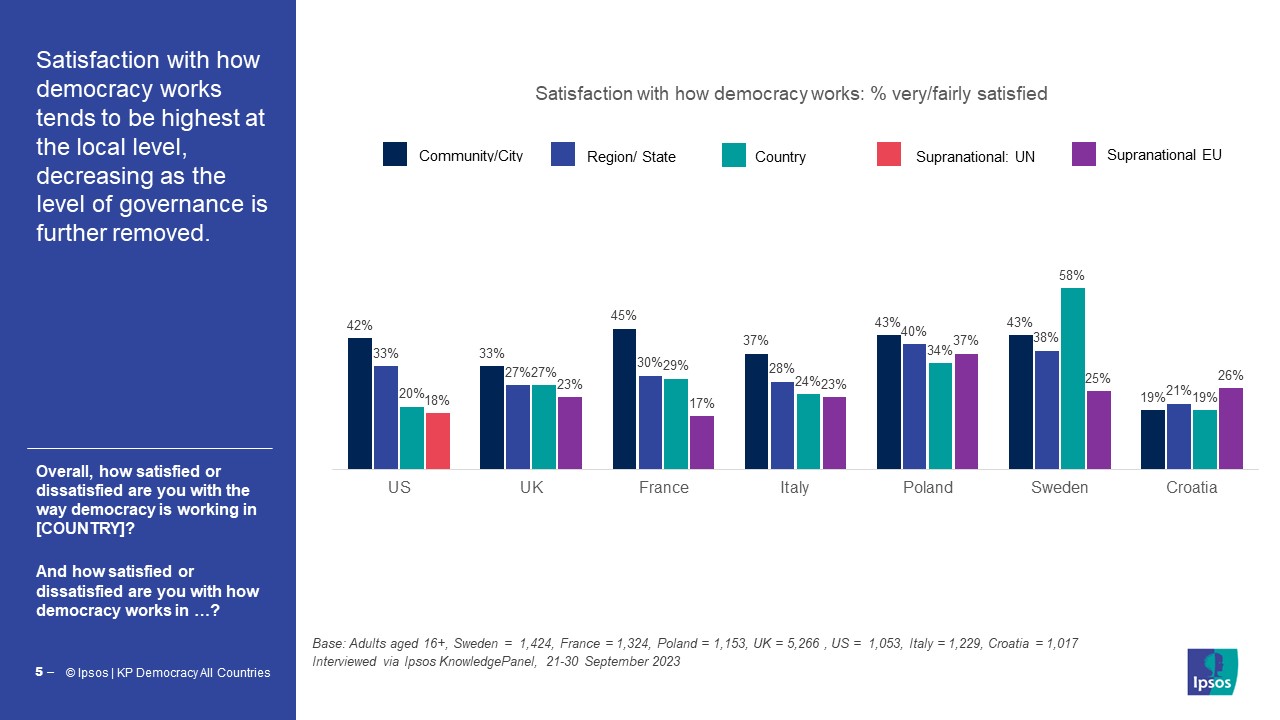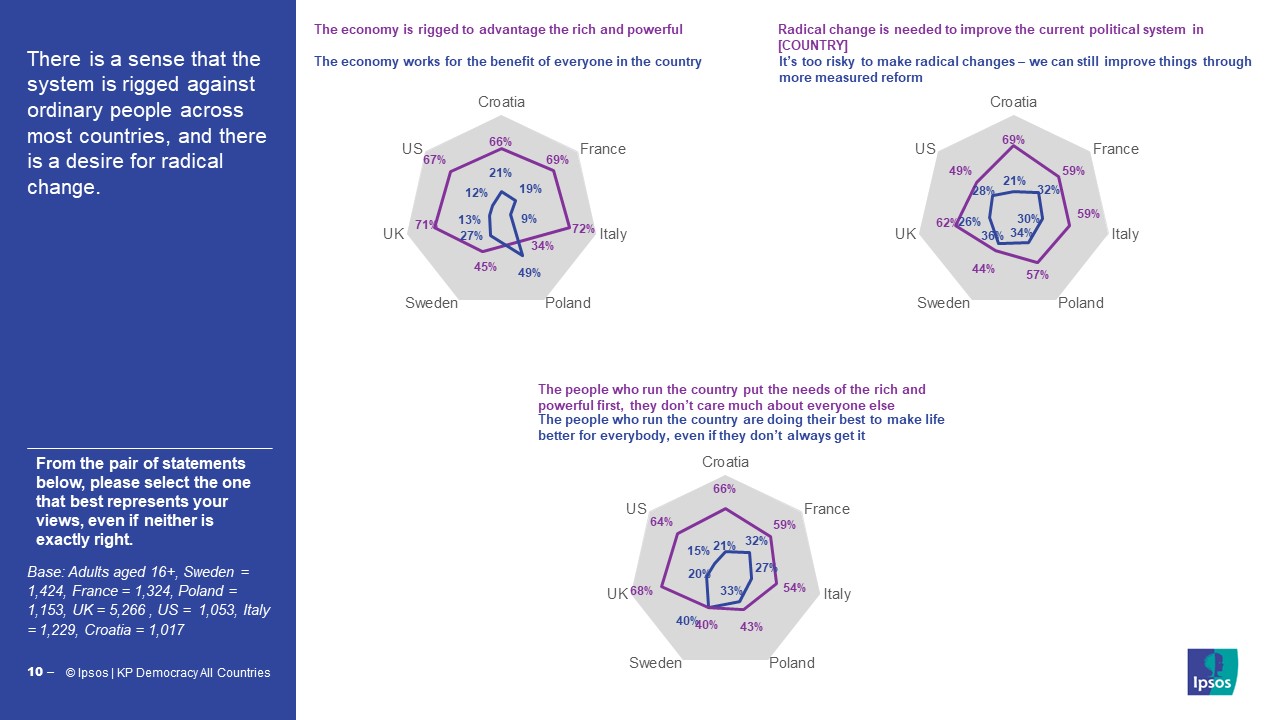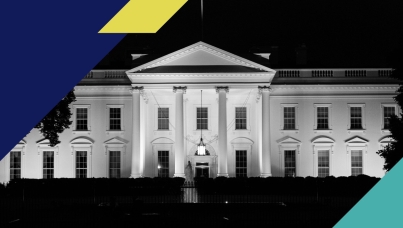Heading into a presidential election year, satisfaction with democracy is low
Washington DC, December 11, 2023--A new survey conducted across seven countries – Croatia, France, Italy, Poland, Sweden, the UK, and the U.S. - reveals support for democratic principles such as voting, building consensus, diffusion of power, despite widespread dissatisfaction with a system perceived to favour the rich and powerful.
Key findings:
- Approximately half of people are dissatisfied with the way democracy is working in their country. The figure is highest in the U.S. (56%), France and Italy (both 51%).
- In all countries surveyed, people are more likely to say democracy has gotten worse than better in the last five years. This rises to 73% in France and 70% in the U.S.
- In all but one country, most people say the economy is rigged to the advantage of the rich and powerful, rather than working for the benefit of everyone. Two in three Americans (67%) agree with this.
- In all countries, most people think radical change is needed to improve the current political system. The U.S. is significantly lower than other countries on this measure with only about half of Americans (49%) agreeing with this, while closer to three in give agree with this in France (59%), Italy (59%), and the United Kingdom (62%).
- However, many people worry about giving their political leaders too much power and feel they can influence things by voting in elections. A bare majority in the U.S. (55%) feel that they can influence things by voting in elections.
- Satisfaction with how democracy works tends to be highest at the local level, decreasing as the level of governance is further removed, something that is true for the U.S. as well.
- People question whether their views are represented by their national government. A third in France (33%) believe their views are represented, the highest in this survey. This falls to 17% in the UK and 22% in the U.S.
Low levels of satisfaction with how democracy is working
A bare majority in the U.S. (56%) are dissatisfied with the way democracy is working in their country. That’s in line with nearly all countries surveyed. And more people think that the way democracy works has worsened over the last five years than think it has got better.
This ranges from 73% of people in France saying the way democracy works has got worse, to 37% in Croatia. In the U.S., seven in ten Americans feel the way democracy works has gotten worse over the past five years. Sweden is the only country polled where a majority are satisfied with the way democracy is working (58%), but, even there, 43% say it is getting worse.

Higher political efficacy at local levels than more remote levels of governance
The public across all seven countries are more likely to say they have influence on decision making in their local communities/city. The perceived level of influence on decision making decreases for regional/state levels, country and is lowest at the supranational level.
A similar pattern is seen around satisfaction with how democracy works at different levels. In the US, UK, France, Italy and Poland, the public are most satisfied with how democracy works in their community/city and least satisfied with how democracy works at the supranational level – with the figure as low as 18% in the US, and 17% France. Croatia is an exception, where a quarter (26%) are satisfied with how democracy works in the EU, and only one in five are satisfied with democracy at local, regional, or country levels.
The system is rigged
In almost all countries people are more likely to say the economy is rigged for the rich and powerful than to say it works for the benefit of everyone. More than two-thirds in Italy (72%), the UK (71%), and France (69%), and roughly two in three in the US (67%) and Croatia (66%) say the economy works for the rich and powerful.
This is echoed in people thinking that those who run their country are more focused on the interests of the rich and powerful. Majorities in five countries (Croatia, France, Italy, UK, and US) say the people who run their country put the needs of the rich and powerful first.
In all seven countries polled, large numbers say radical change is needed to improve the current political system in the country, from 44% in Sweden, to as high as 69% in Croatia. However, the U.S. falls on the lower end of this spectrum, with just half (49%) believing radical change is needed to improve the current political system.

Strong support for democratic principles despite desire for radical change
Despite desire for radical change, this survey finds strong support for institutions and approaches to politics defending democratic values. In all countries, more people than not say they can influence things by voting in elections. Specifically, a bare majority in the U.S. (55%) feel they can influence things by voting in elections. And more people globally say it would be too risky to give the Prime Minister/President more power, than say it would be more effective if the Prime Minister/President didn’t have to worry as much about votes in the legislature. Fifty-five percent of people in the U.S. agree that it would be too risky to give the President more power.
Alex Bogdan, Research Director at Ipsos says: “Our research confirms that there is clear dissatisfaction with how democracy and representation work in practice in the seven countries we have polled. While details vary, the general sense across the countries is that the current political system is not working well to serve the needs of ordinary people and there is appetite for radical change.
“Yet we also find strong support for institutions and approaches that promote democratic values, like voting and diffusion of power. The question for political leaders is if they can harness that desire for participation and reconciliatory politics to improve how our political systems work and what they deliver for people.”
Commenting on the EU findings specifically, Managing Director of Ipsos European Public Affairs Christine Tresignie stated: "the research shows that across the EU countries surveyed, majorities remain in favor of the European Union. That said, only around half or fewer have a positive image of the EU. Further, in all the countries, people are much more likely to say their image of the EU has worsened over the last year than to say it has improved, with the figure rising to 51% in France and 62% in Croatia. These findings suggest that a key challenge for the EU ahead of the 2024 European Parliament elections will be to leverage continuing support for the EU project to help restore positive perceptions of EU institutions, agencies and bodies, and the work they do.”
For more information, please contact:
Alex Bogdan
Research Director, Ipsos UK
Chris Jackson
Senior Vice President, Ipsos US
Cristina Tudose
Head of Ipsos KnowledgePanel Europe
About Ipsos
Ipsos is the world's third-largest Insights and Analytics company, present in 90 markets and employing more than 18,000 people.
Our passionately curious research professionals, analysts, and scientists have built unique multi-specialist capabilities that provide true understanding and powerful insights into the actions, opinions, and motivations of citizens, consumers, patients, customers, or employees. We serve more than 5000 clients across the world with 75 business solutions.
Founded in France in 1975, Ipsos is listed on the Euronext Paris since July 1st, 1999. The company is part of the SBF 120 and the Mid-60 index and is eligible for the Deferred Settlement Service (SRD).
ISIN code FR0000073298, Reuters ISOS.PA, Bloomberg IPS:FP www.ipsos.com



